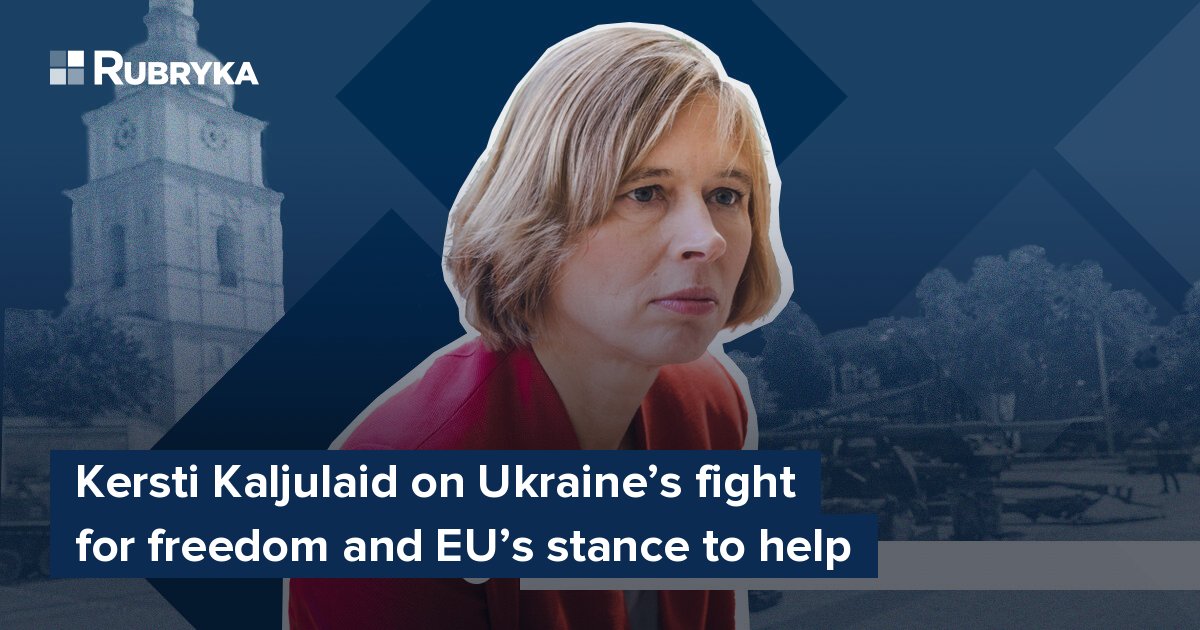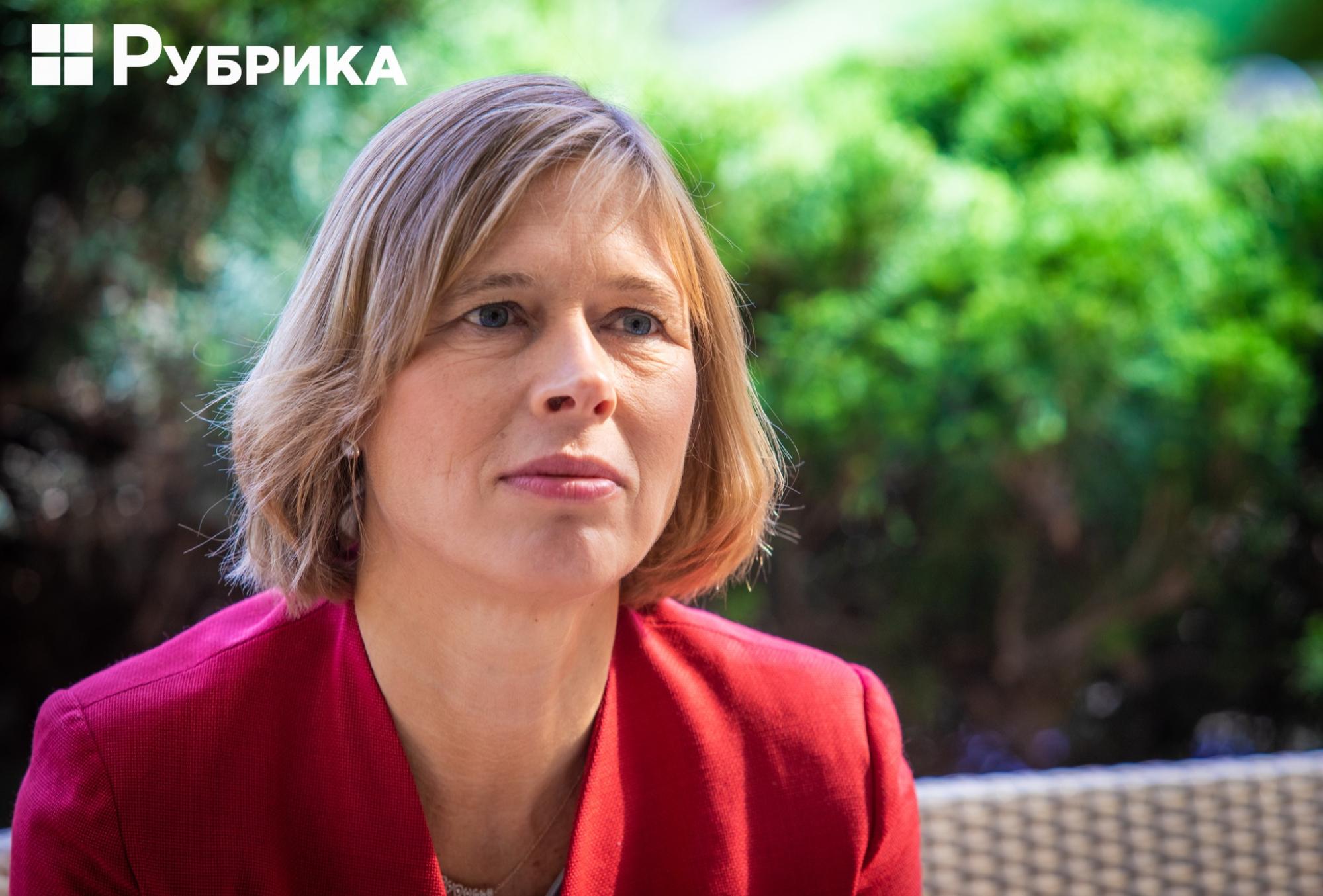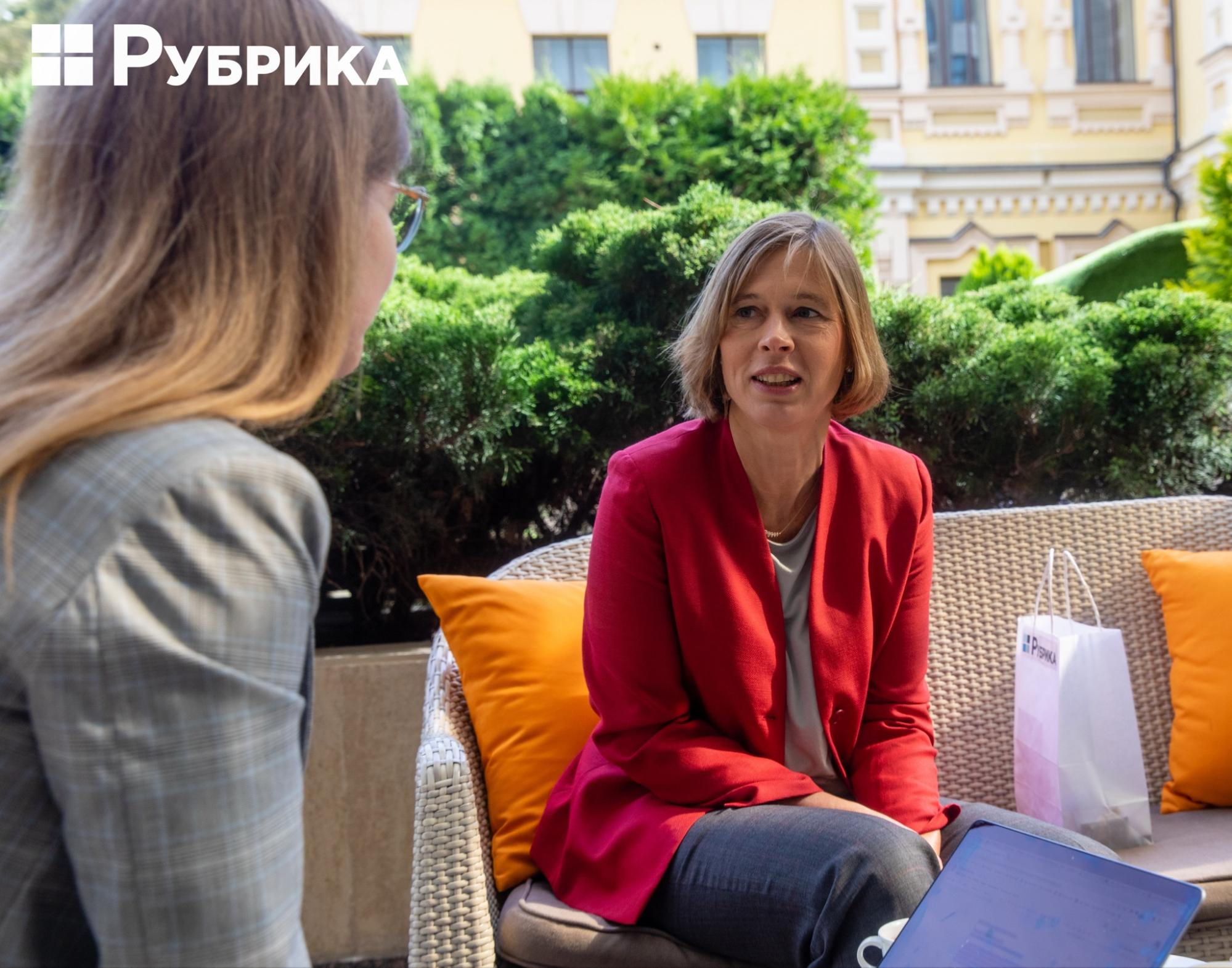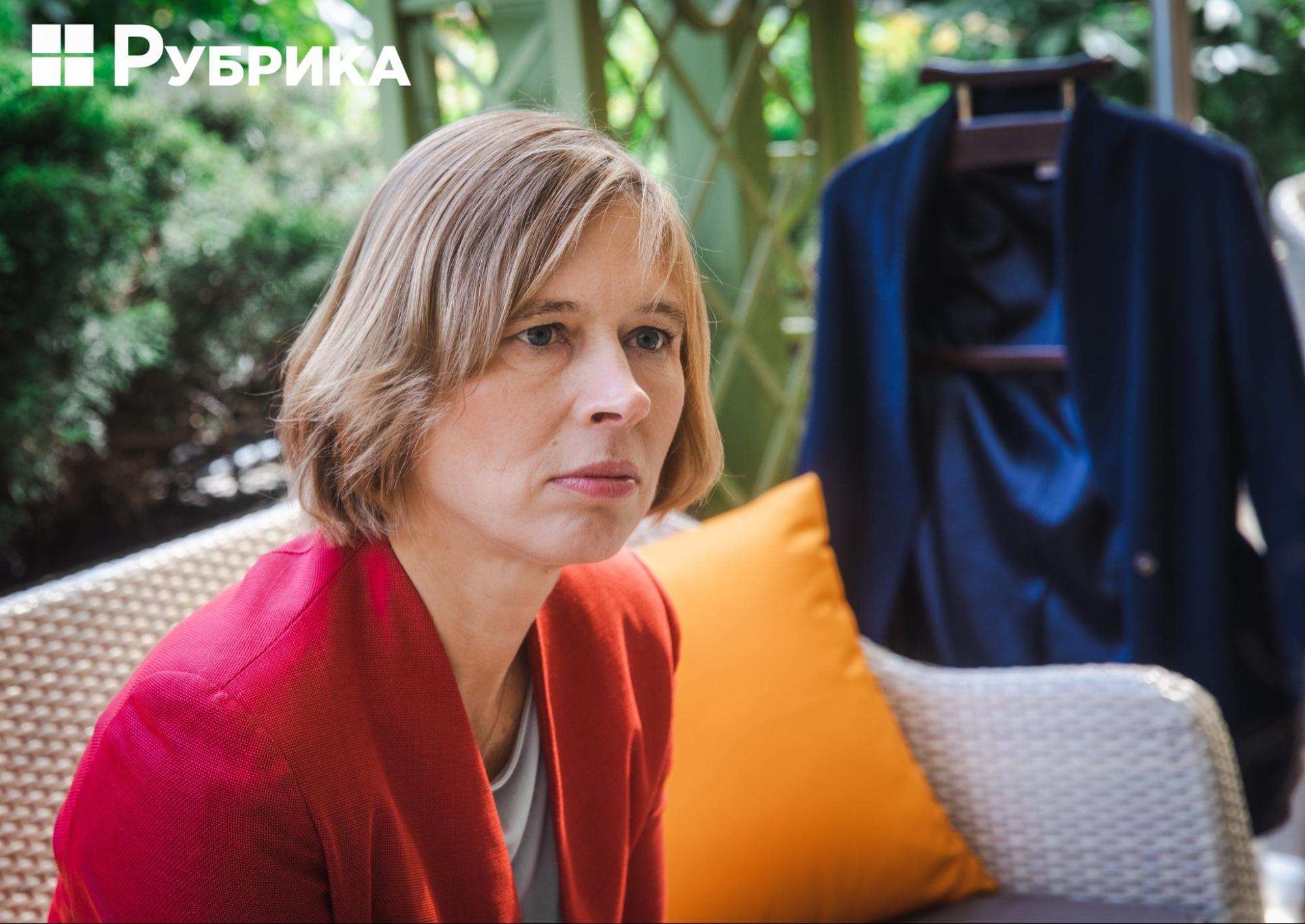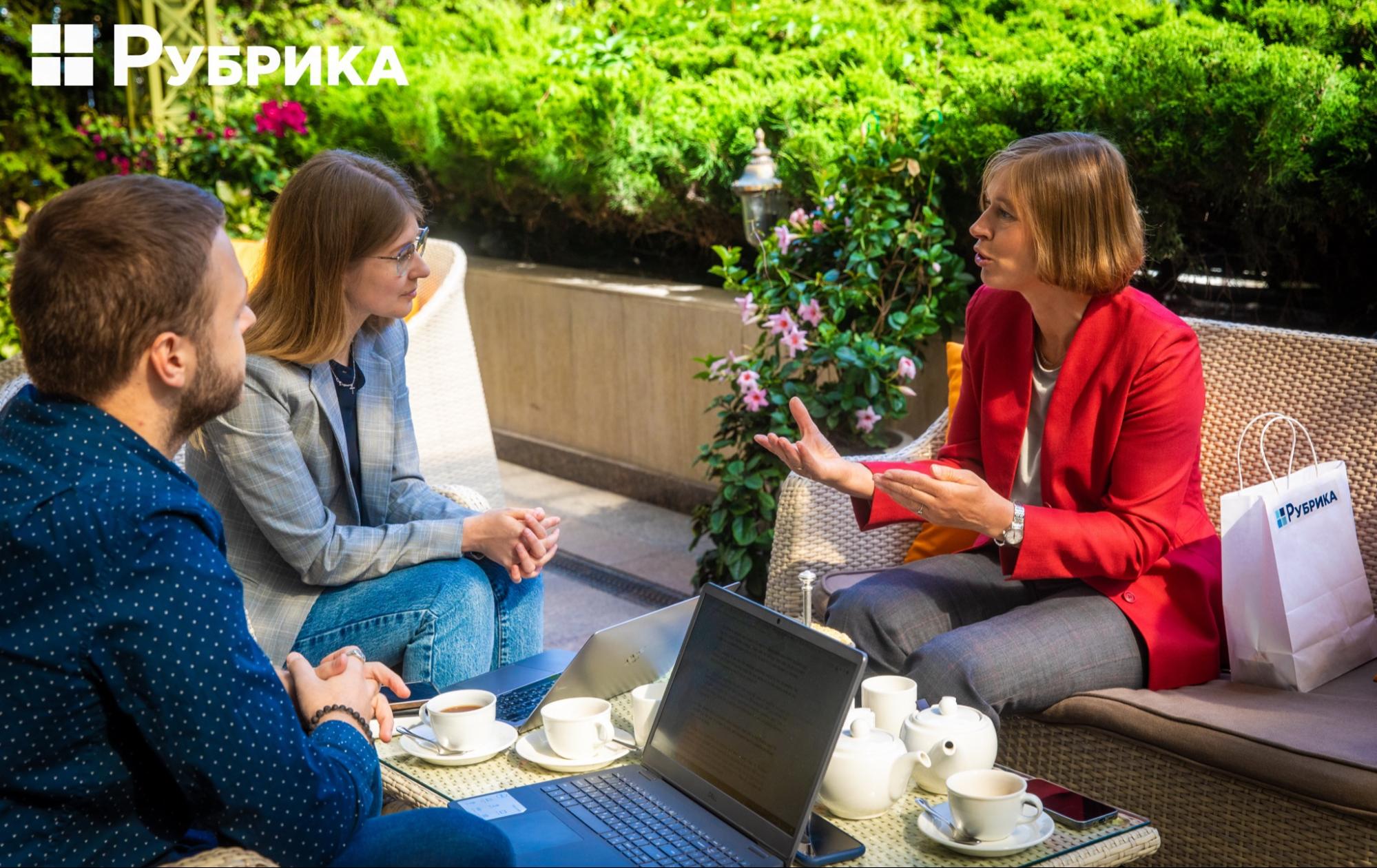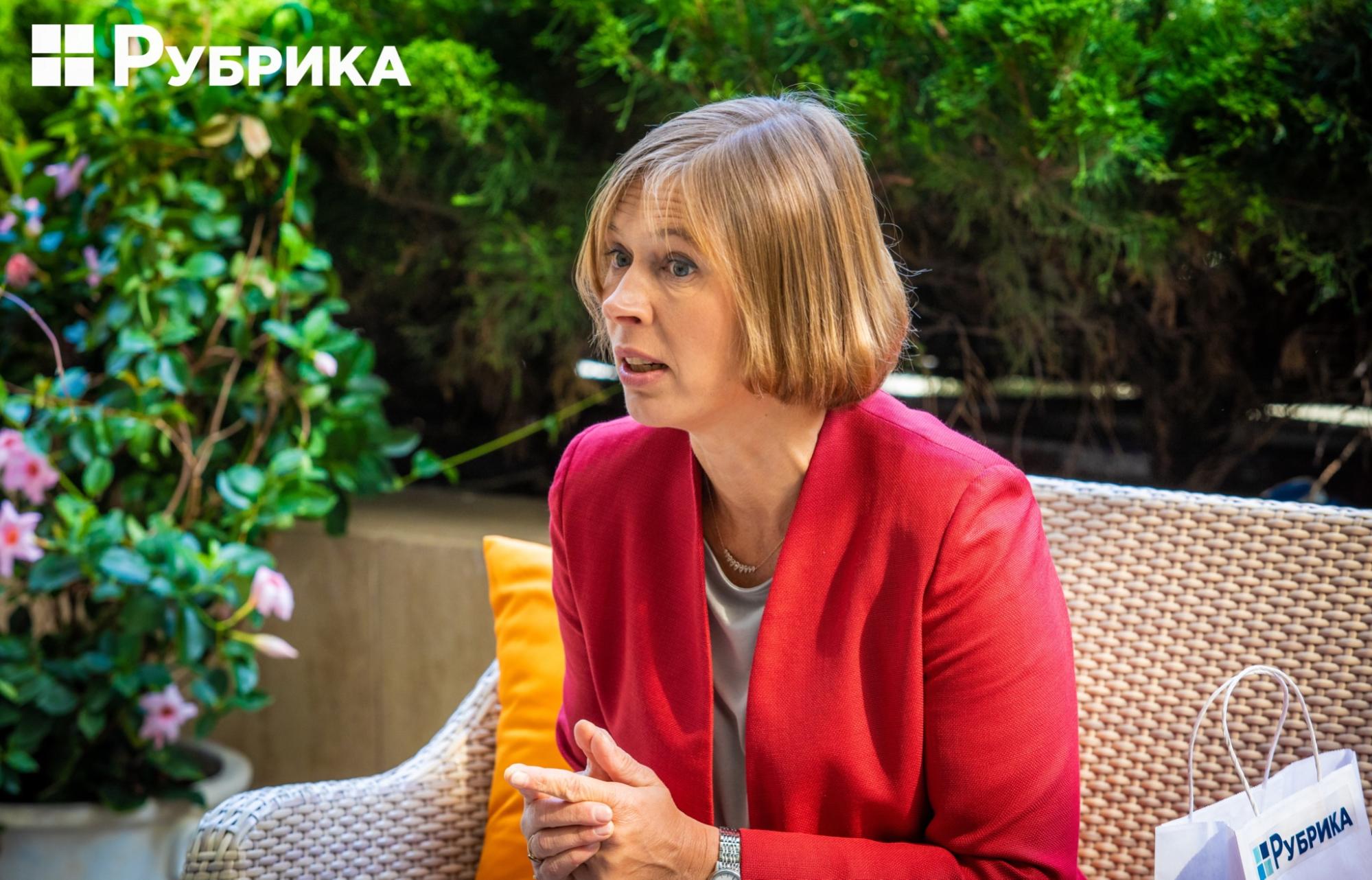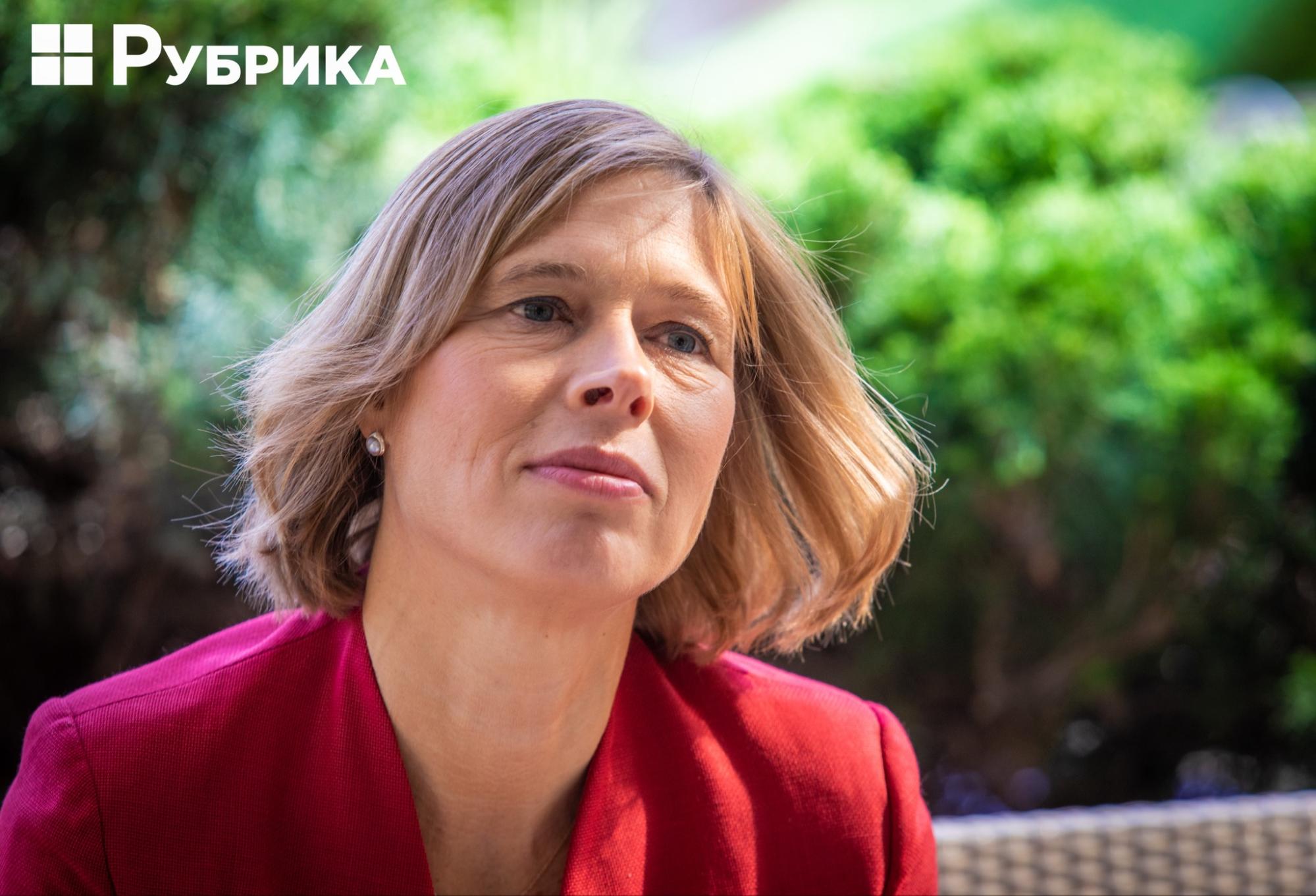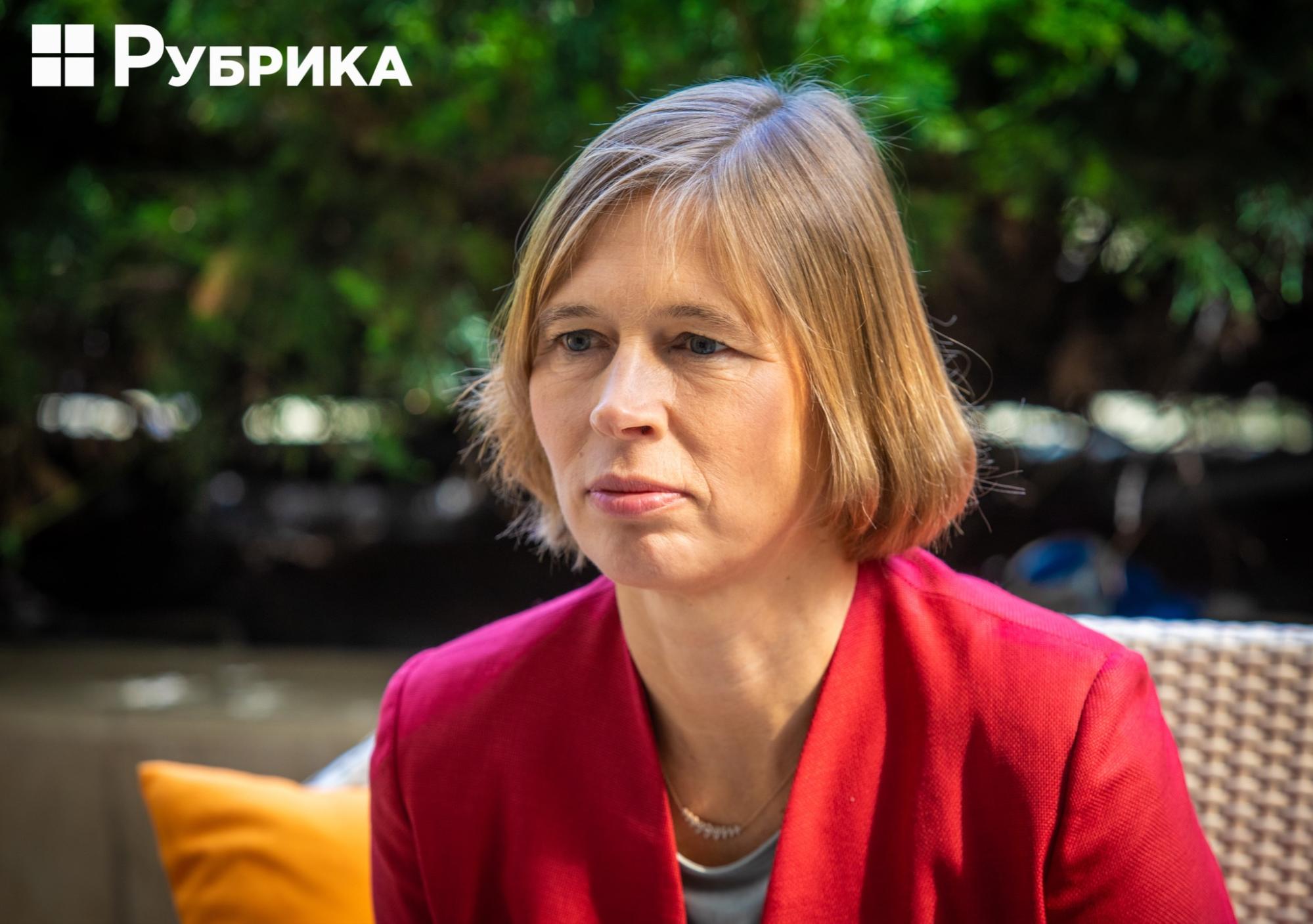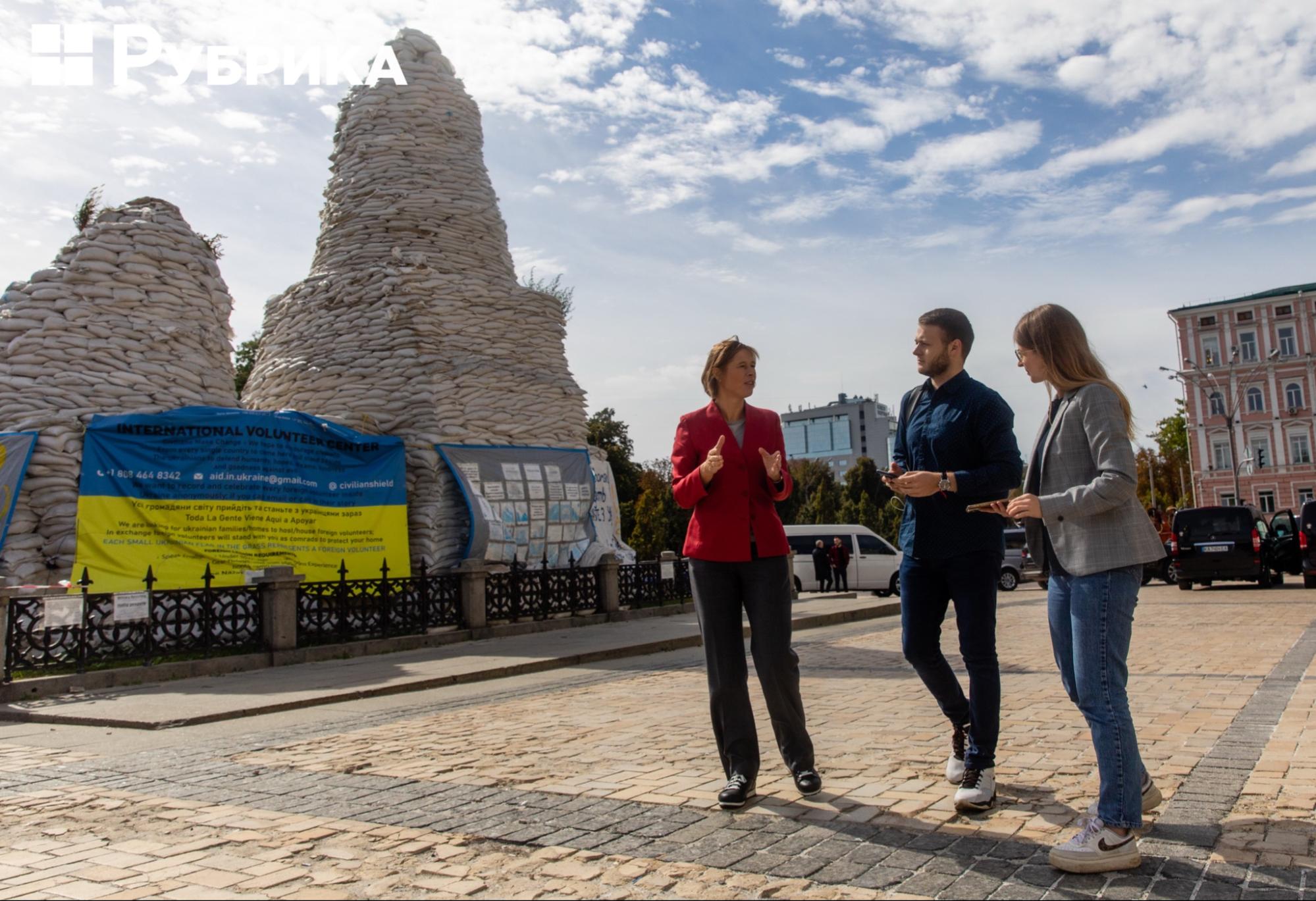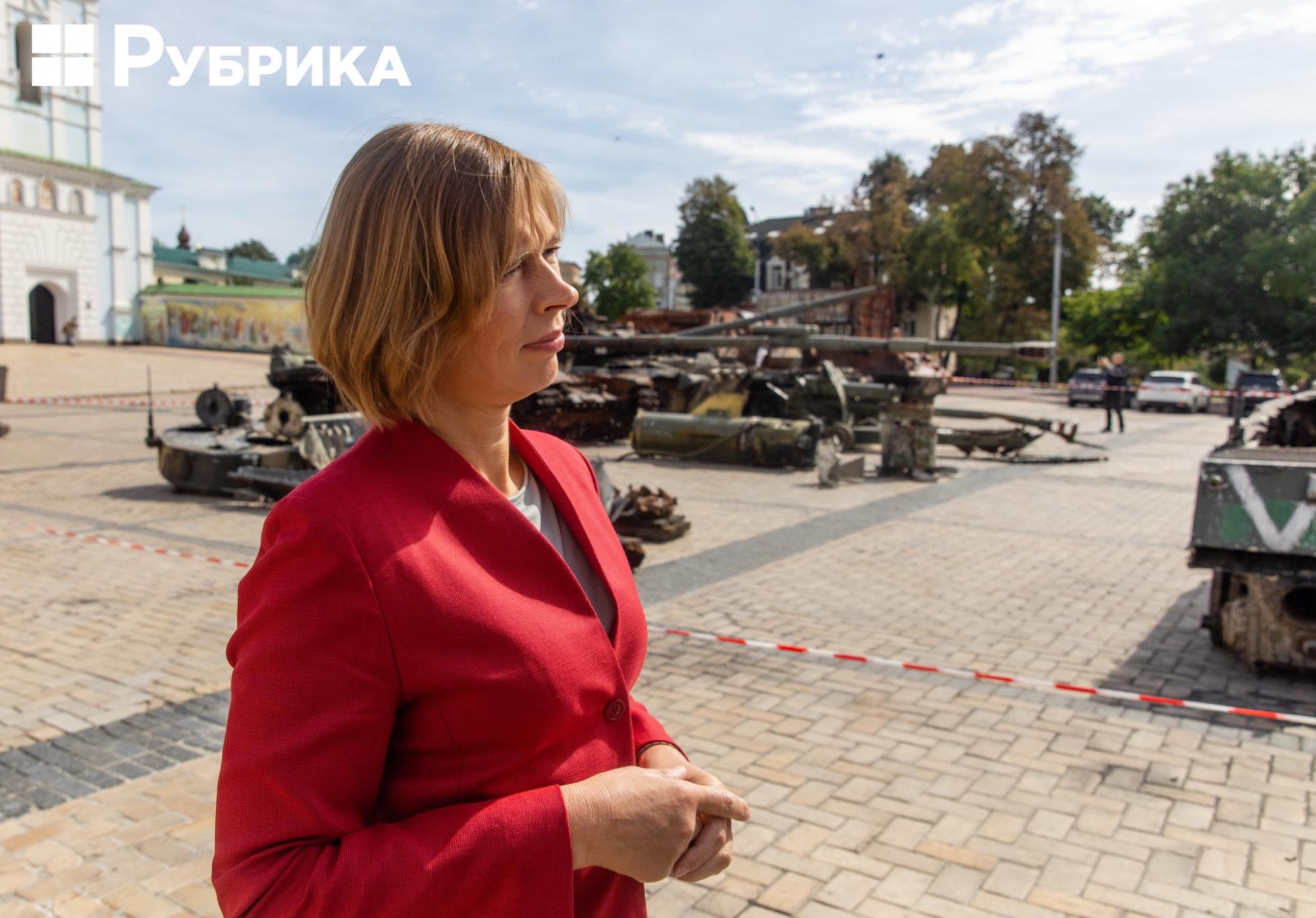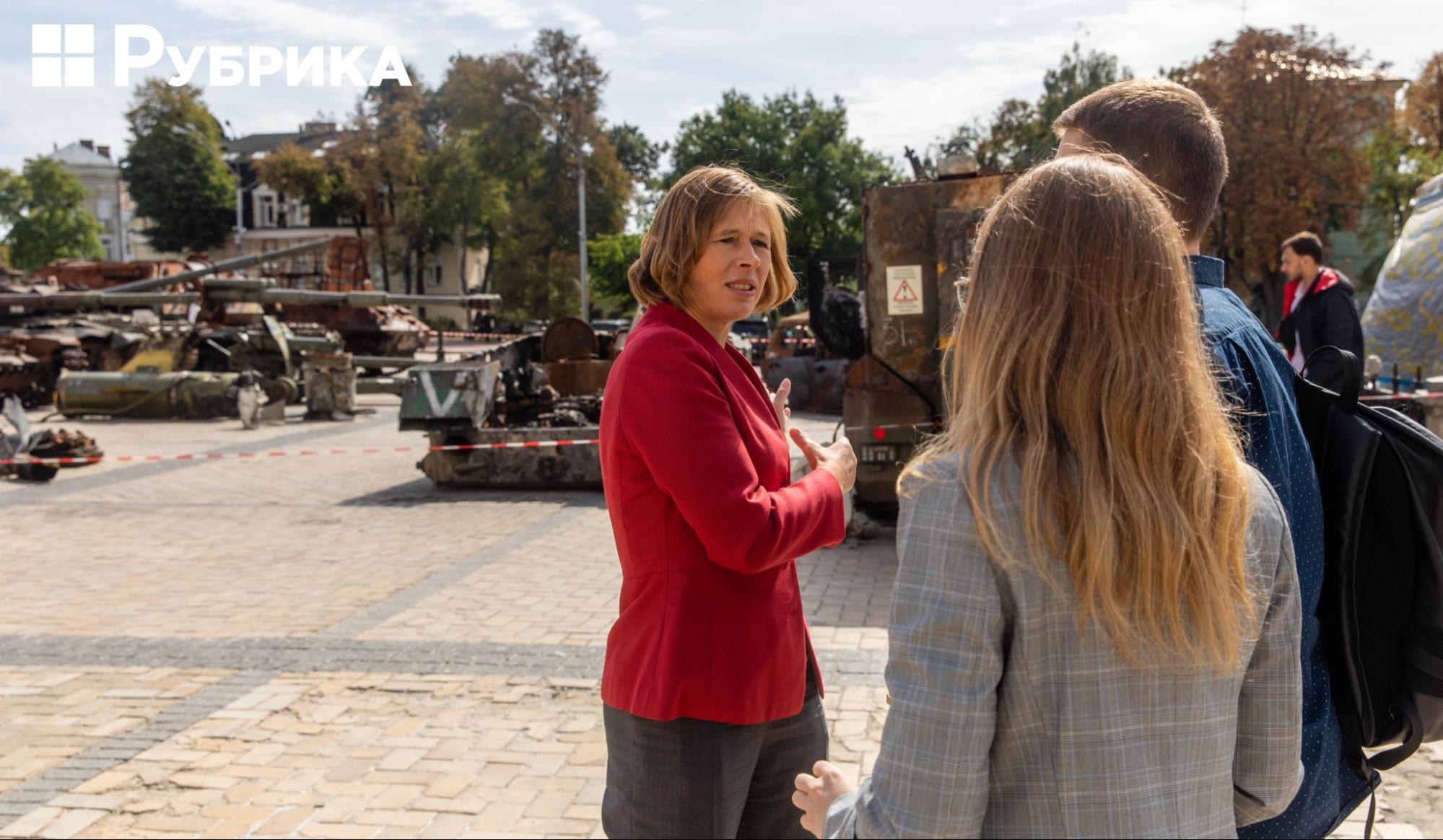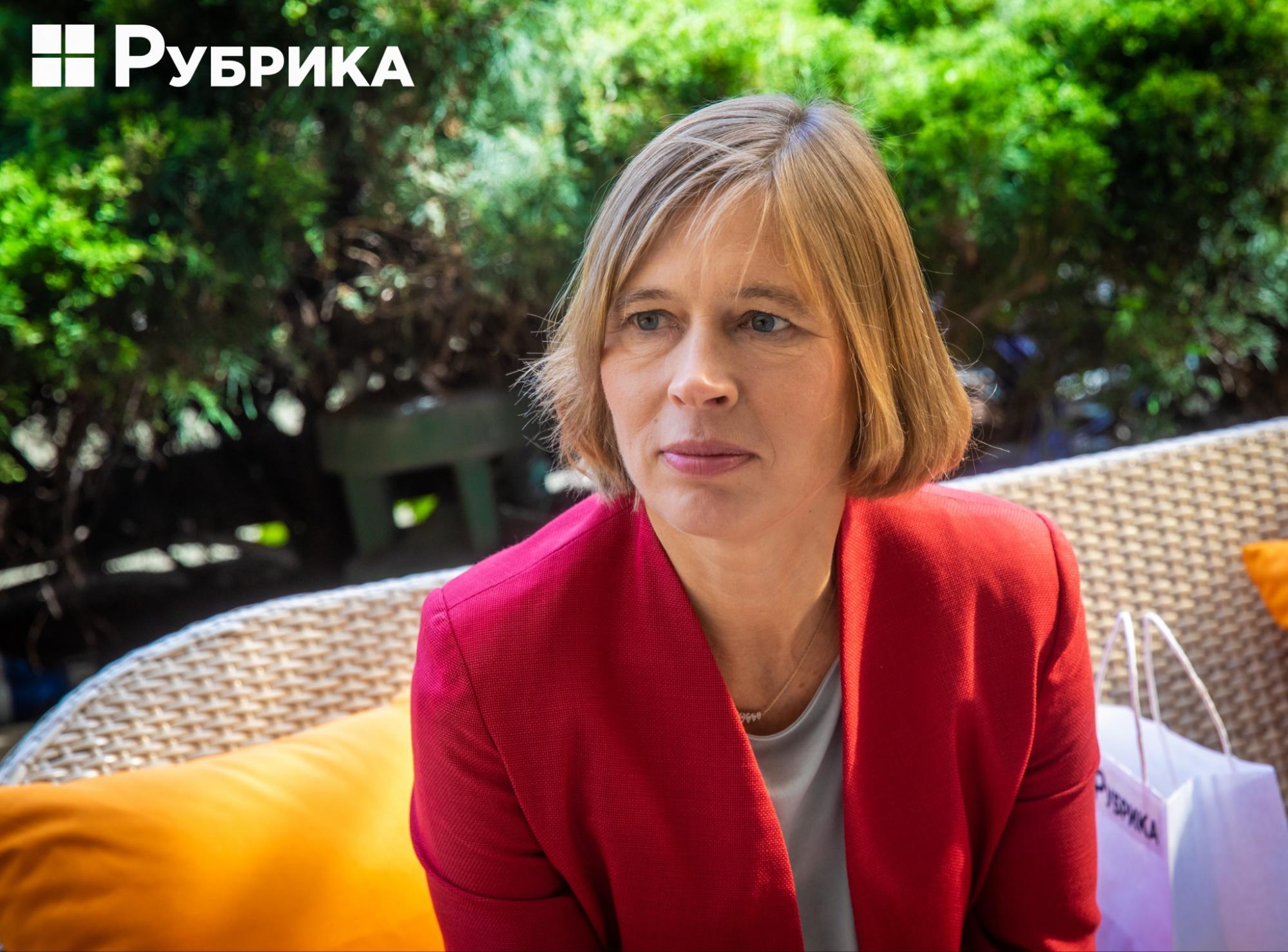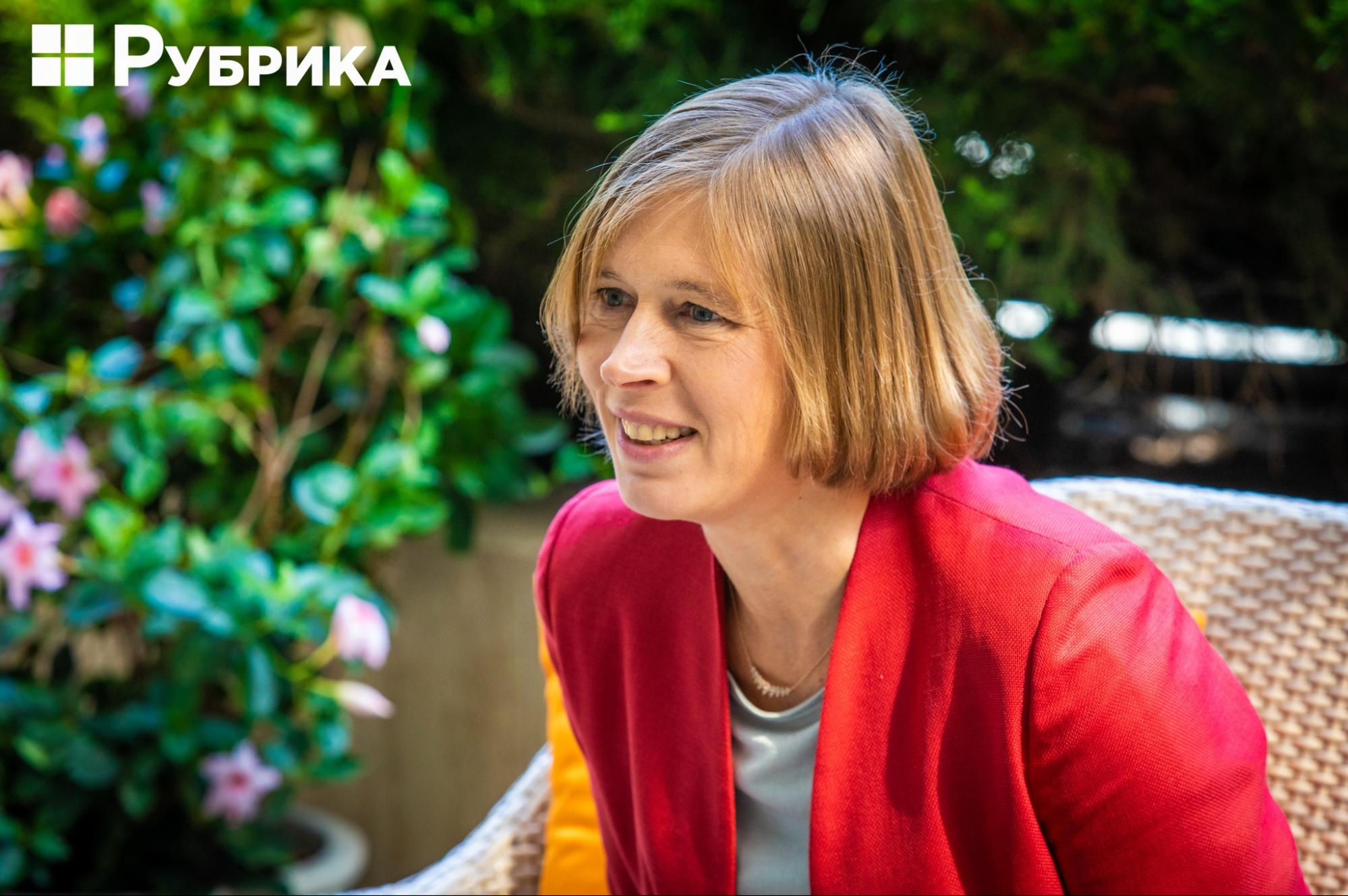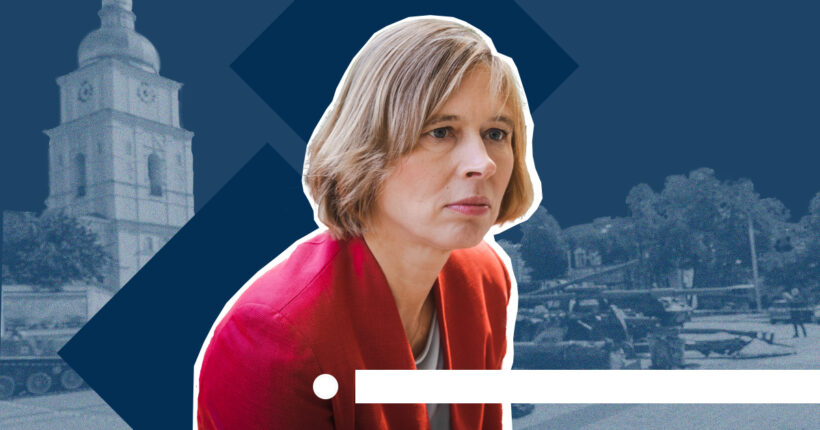
We met Kersti Kaljulaid, President of Estonia in 2016-2021, as she visited Kyiv for YES (Yalta European Strategy) 17th annual meeting. As opinion leaders and politicians from all over the world discussed Ukraine's efforts to defend its sovereignty, independence, and freedom, "Rubryka" met and talked with Kersti in person. As a former President of Estonia and a big supporter of Ukraine (and Ukrainian independent media, in particular), Kersti Kaljulaid shared her thoughts on Ukraine's accession to the EU, the EU's efforts to assist the country at war, and all things topical – in a conversation with "Rubryka".
– Ukrainians constantly hear about people in the West getting tired of the war. Ukraine rarely makes headlines anymore, people are concerned with prices rising, winter is approaching and that doesn't make anything easier. Do you agree that all this reflects the Europeans' current mind? If so, what do you think can be done to keep people from forgetting there is a war where so much more than they might think is at stake?
– No European, of course, can forget that there is a war because they feel it, paying the so-called war taxes, paying high energy prices, and inflation is generally high in Europe, so people of course connect these facts with the war. People are scared of the economic effects of the war. But I wouldn't say the picture looks universally bleak. Many people clearly understand what is at stake and it is true that most of us understand what is at stake and are all hands on board – those who are in office or those who have already left the office – we do go around and explain the situation on business forums, political forums, at think tanks, universities. Of course, there have always been arguments – how did it exactly help Georgians or Crimeans to seed ground?! It didn't. But now there is an addition, you can always say – it's not ground, this is people, lives, deportations. But this needs to be repeated and repeated. Because otherwise, it's more kind of a geopolitical game, but the discussion is about real lives. On the other hand, it doesn't land on infertile land if we talk about these things, people really start thinking. This is our role – to make them think and feel.
On Ukraine's way to the EU
– Matti Maasikas, Head of the EU Delegation to Ukraine noted that Ukraine is more ready for EU candidate status compared to Estonia when it obtained this status. Do you think he has reasons to be so optimistic? What does the process after the candidate status look like? What is the way that Ukraine may use in terms of Estonia's experience?
– I see where Matti comes from. When we were among states that were supposed to become part of the EU, there was no such process as the one currently accompanying your association agreement, like the Deep and Comprehensive Free Trade Areas agreement. You are already measured or analyzed, in terms of your compatibility with the European market framework by this process. The criteria and the framework are the same. You know what to do, even without having a further roadmap for how to start the procedure of joining, just by fulfilling and continuing to fulfill that roadmap. In this sense, I think Matti is right. On the other hand, you are not scoring on every element really well. There are some surprising elements, even before the war, like transport or corruption. On the other hand, you have many elements where you score high. For me, the biggest value is your high score in civil society because we all know that in 2014 you made sure that Ukraine is not following the Belarusian way of relating between West and East. And this was civil society driven. And this obviously was seen by the people in the West and this is what you're carrying through. But the process is indeed cynical – you will have a framework, you have to jump all the loops. Ursula von der Leyen has many time stressed that there are no shortcuts, there will be no special way, but there will be the normal way. And there is nothing wrong with the normal way, it helps you build strong institutions and then join the EU. We all are ready of course to work with you and help you along the way.
– Don't you think it's a paradox for Ukraine – strong civil society and not-so-strong governmental institutions? Do you think the only way is to integrate those people from the civil society into the government or is there a chance to restore the system from within?
– Basically, there is always such a discussion. But for me it is always one answer, if the civil society wants to have an influence on the current political system, then it has to join the political system. This is how we influence in democratic states. Our policy-making is we go voting, we stand in elections, and we stand for the principles we want to fulfill or achieve. There is no contradiction. But of course, I understand, it was the same in Estonia, when we gained independence, of course, institutions were weak simply because there was no legal base. So quite a lot depended on cooperation between communities. Then gradually you move towards the stronger state with which also comes positive or negative effect – people start to rely on the state and it actually takes away part of the motivation, it comes back at the higher spiral level. Now Estonia again has quite a strong civil society, but it is kind of different. We don't depend on it for the functioning of our country. It's more about making our community more competitive compared to other communities. In this sense, I see many similarities, but the important thing to stress is that there is no contradiction.
– I think in Ukraine and in some EU member states, there were some thoughts that the EU wasn't flexible enough. At least, that's how it is seen in Ukraine. Now it seems vice versa. The EU provided the candidate status to Ukraine. Ursula von der Leyen just recently said about 8 billion euros in macro-financial aid were allocated. Ukrainians were expecting more assistance from NATO but got a lot from the EU. Do you think, for the EU, it is a moment of some kind of transformation?
– I think you cannot compare the two organizations because one is only specifically dedicated to the defense of its members, and the other is a political body that is trying to organize life in Europe as best as possible at the high political level. This discussion of Europe not functioning has always been foreign for me, because I always say, try to compare what we have in Europe to let's say the climate fight process, the COP process (Climate Change Conference of the Parties) process. In the EU, we have a place where we gather, we have the treaty according to which we negotiate, and we have implementing bodies like the Commission. We have permanent political guidance from the Council, and also at the Parliament, it's all organized. Of course we can argue, but finally we can make decisions the way we know and implement opportunities. Comparing it to COP, if we didn't have the Union, we would have a very similar process to theirs. First, we spend two years arguing about where the next summit will be and which would be the rules. Nobody would implement the decisions anyway. In this sense, Europe has always been efficient and effective.
It's a difficult legal construct but it's a place where the leaders come together and decide. The EU doesn't have responsibility for redistribution of policies in member states, or tax policy. Each member state can develop the way they want. For example if we compare highly digitalized Estonia to some other country, it is very different. They are taking different directions. Countries still find ways to work together, but there are rules and the system set. It was in the banking crisis of 2008 for example, similarly the EU leaders came together.
When they found that the treaty doesn't give us all the necessary tools, they believed that they needed to go outside the treaty and among member states negotiate for a European stability mechanism. This is exactly what has happened now with Ukraine. It's slightly outside of the normal procedures that you've been given the candidate status. But this is how the leaders can take political responsibility and decide. Europe functions this way, it has proven many times in the crises this is how it works, so everybody who says that Europe is inefficient has to think twice.
– In 2021 you said that Ukraine "will need 20 years of work" to be ready for membership or even is light-years away from EU accession. Did you change your mind after everything that recently happened?
– I was asked about the progress of the last 30 years and specifically about institution building. If you predict from the past, then you get this future, it's like economic predictions, they're always based on the past, then you can predict the future. And it was illustrating the movement towards truly independent institutions and separation of powers has been relatively slow, which of course comes out of the analysis. This is feasible from there. You can do it much quicker and particularly this might be a good opportunity after the war to use the full power of the IPA (Instrument for Pre-accession Assistance), this is pre-accession help, which targets the help to build the institutions specifically. Everybody's interest in making this work for Ukraine will be massive. Because initially there will be a lot of money coming to help to rebuild Ukraine, but eventually you need private sector and multilateral investment to take over to continue the rebuilding process. This means that companies must feel comfortable in Ukraine. If I have an argument with somebody, it should be resolved within the court system, it is absolutely necessary for Ukraine's future development.
Now people understand that probably much clearer and are ready to move quicker. Combine this with the IPA and I think you have a lifetime opportunity here. It's hard to say because the war is not over and we don't know how long it will take.
I'm convinced that the war will end in Ukraine winning. What does the win mean and when you have won this is for Ukraine to decide. We don't know when you decide, but this is for you to decide and I'm sure that people here are ready to move heaven and earth to win.
On EU's assistance to Ukraine and sanctions against russia
– I think to win we also need more assistance, especially from those countries that for some reasons haven't provided much compared to others. How should Kyiv continue to persuade others and should we try to do so? Or just concentrate on the existing partners to ask for more assistance and deepen cooperation?
– The EU in many wide areas decides unanimously and this is a good kind of school for you to start practicing. Of course, Ukraine needs to spend a lot of time in discussions to make them come closer to your positions. We've done it for 30 years, this is how it works. And it's normal diplomatic work to concentrate also on those who have different opinions for various reasons. I think the most important way is to bring them as close as possible.
For example, Germany has actually been doing quite a lot if you look at what they've given and it also keeps coming from Germany despite the fact that Germany has been seriously investing in their own defense. I would actually give them some praise for that. I would say that talking to everybody and seeing the rays of hope in every of these discussions is the way forward. This is how the diplomatic world works and the EU is a body where you have to decide unanimously, where you have to find common ground with everybody every day.
– Do you think even the fact that the invasion was launched proved that all the sanctions imposed from 2014, were not as strong enough, and didn't have the expected outcome?
– If you took the economic effect of the sanctions purely, you could not say so because in fact, we have to look at what Russia was able to amass before the full-scale invasion. They started with about 130 thousand soldiers, who were obviously not equipped well enough to achieve the objectives they wanted to achieve. It's extremely difficult to compare how much stronger the Russian economy would have been without the sanctions imposed.
Their miscalculation was that Ukrainians would not fight, and it was quite common thinking in the West, that you would not be able to fight. But you did. That's why you were able to mass all the support. Every day you bravely demonstrate you are able to fight and this brings new support in. And this is very much influencing the way people in the West see and react to this crisis. We don't know how much more powerful russia would have been. There have been technological handicaps, people are daily seeing that russia is using stuff which is not up to the 21st century. It could be partially because of the sanctions. Sanctions anyway make it more expensive to get technology if you can get them in some way. Of course we can say, sanctions being also several years old, the economy is flexible. In one way it's good, because economies continue to restart growing after they shut because they adapt, but part of the adaptation is finding the way, building logistical chains to go around the sanctions. If you want sanctions to work, you have to constantly re-evaluate them. In Estonia we are doing that. Every now and then we find that something is not working and we see what we can do to make them work better. This is what you need to do with sanctions. Overall I think they are tools that we have to use.
– For example?
– We need to keep them in place and continue our energy turn and make sure that we don't go back to business as usual. There is responsibility for the West, that even if the war is over, but if it is over without regime change in russia, the ball is back in our court. It means only economic sanctions will make sure that russia doesn't rearm. And not rearming russia serves economically beneficial for all of us. Yes, we lose some because we don't trade, but on the other hand we save some because our defense spending doesn't need to be so high. There are reasons that if this war ends without regime change in russia to keep the sanctions.
– Starting from September 19, Estonia will stop issuing visas to russians. Chancellor Scholz opposed such a decision for the whole of the EU. And from this date russian citizens holding Schengen tourist visas will be barred from entering Estonia, Latvia, Lithuania and Poland. What do you think the proportionate response from the bloc would be?
– Everybody agrees that we will scrap the rules which made visa applications easy and cheap for russians. This is already agreed. For the rest, if there are no flights and there are no those who have land close to the border, how much practically will the russians still travel to the EU? Border countries have specific responsibility and most of them have already taken that on. We of course continue convincing others as well. Scholz is by far not the lonely in thinking. There are others as well who take the helicopter view and say, "there are dissidents, there are people who actually want to be seen in Europe." What we are really seeing this summer in Baltic states is the massiv tourist travel through our country, numbers are very high. And putting these numbers with the numbers of Russians supporting invasion – it doesn't add up. We think that ordinary russian people need to feel as well that life is not as it was before. The reason for that is putin's regime.
– Considering even the most independent polls, up to 80% support the invasion.
– There are hopeful signs. I've read about it recently, that there are also a number of people who are undecided. It is growing up. Considering that people in russia are not free to answer these polls. This can only change if enough people feel this is intolerable like you did in 2013. This is the only way things can change, unless there are free elections.
On war and negotiations
– You met and spoke with President Zelensky several times. What were your takeaways then and thoughts on him starting from February 24?
– I remember my first meeting with him, which was the day of his inauguration. He knew what he had to talk about with Estonia, he knew Estonia's position, where we might have issues to discuss and he's been able to grasp things really quickly and fitting to the road, which history has thrown on him. Now Europe sees it too.
– Many Ukrainians probably feared that Zelensky was not that strong, mature, and experienced to hold the invasion. We haven't heard anything about him possibly fleeing the country, but I think his popularity was going down with the beginning of the invasion. What were the thoughts in Europe about the upcoming threat? Of course, we understand that not everyone was expecting the invasion in that form, but were Europeans afraid that Ukraine would not be resistant?
– Obviously, everyone was worried about russia's steps. Of course, we had the warnings from the US, but I do understand why many people thought, including your president, who remained at the position, that a full-scale invasion was unlikely.
Because we all know that during the Chechen war, Russia needed 70 thousand soldiers to get Grozny. Compare sizes – it was unthinkable. The misunderstanding was there from russia's side. putin thought no Ukrainian really cared who the president was: Zelensky or putin. Because putin doesn't understand that civil societies have their own will. Remember the Belarus uprising – he was like, "West is enlarging their sphere of interest". For him, people are just objects, not subjects. He couldn't believe that Belarusian society collectively decided that they wanted something different.
Of course, if you don't believe in such processes, you come to the conclusion that "okay, we change the rulers – nobody cares." But unfortunately, this is Russian tradition — that life goes on and it doesn't matter what it is: tzars, Soviet Union, putin. But in free societies, people believe their will has meaning, which was his miscalculation. Ours was, that we thought it must be insane, to waste such resources trying to invade Ukraine. But I think you have a fantastic leader as President Zelensky for Ukrainians and for the rest of the world. Because he is very clear, able to put things dramatically clear, and not afraid to put things dramatically clear.
– Recently Ukrainian foreign minister Kuleba noted in an interview, that during the negotiations with Lavrov in Turkey, Lavrov admitted that their real demand was demilitarization and denazification. In your experience in negotiations, what were they expecting from Ukraine in terms of Ukraine's strategy in these talks and others?
– I think what russia is always trying to do is to choose the partners with whom they negotiate. So, letting Ukraine behind the table, agreeing with Germans, French, and the EU about Ukraine's fate – is not something they want to do. We all support that the partner is Ukraine, and it's only for you to decide when you are ready to negotiate for peace. Nobody can influence you there. But this is of course, what is Russia's strategy to get others to agree about you. So this is what we need to openly discuss ourselves. No way, this is only for the Ukrainians to decide. We supply, we provide, Ukraine decides. That's what I've always been saying everywhere. We don't know how it ends, but it is only for Ukraine to decide.
On the future of the free world and russia's 'simple men'
– In March, at the event of the Institute for peace, you mentioned that "the future of the free world is at stake in Ukraine. If Ukraine loses, we would have lost." Why do you think some EU states are not compelled enough by this?
– I think more and more people are. If you look for example at the public opinion in Germany, the changes that have taken place, and the Zeitenwende speech (referring to the historic turning point in German, the speech by Olaf Scholz on February 27, – Rubryka) we see public opinion also consolidating behind understanding what really is at stake. I think we should continue to explain via good examples, such as russia's war crimes exhibition, which has been traveling through Europe, and was installed in the European Parliament.
We need to continue convincing people what this is about, that the war has to be won here and that it is for every other country. If we can only keep supporting you, this is a very small price in comparison to what Ukrainians are paying.
You are paying the highest cost of this war and the least we can do is support you in any way. If you get through to people and explain what is going on, then they do understand. The question is that we need many people to go out and talk, not to give the floor away. Again, you need to talk particularly publicly and through the media to those who initially do not see your viewpoint. I always say that putin has achieved so much. First, he achieved NATO enlargement, he's achieving EU's enlargement through Ukraine and Moldova, hopefully, Georgia will one day be able to fulfill the criteria and join. It's weird how it all worked out. It shows that we are moving in the right direction and it has to be with public support because otherwise, politicians would not be able to make these decisions.
– It is interesting that his inner circle is basically the same. We haven't seen many resignations from his inner circle. We have just seen the meeting of the National Security Council when everyone agreed to recognize the so-called Donetsk and Luhansk republics. Do you think there is no one who can make a stand? For example, even Navalny did not oppose the annexation of Crimea and also that is one of the reasons he is not so popular in Ukraine. In terms of putin's policy he's supposed to be in opposition, but in terms of Crimea – not quite. Is there anyone at least visible in your opinion?
– I think it's very easy to make this error. If only there wasn't this one tyrant, things would be better. No, this is the regime. This is also something that needs to be explained in the West. Stalin went but GULAGs stayed. Everybody thought that the Soviet Union is now kind of a partner because Stalin had gone away. But I'm sorry, there were political prisoners, where people died for their principles, all through Brezhnev's stagnating years.
And sometimes Brezhnev's years are presented completely differently, but no, it was still a very oppressive regime. And this is also a very oppressive regime. There are no dissidents among the top because they are part of the regime. They agree with it. This is something that we needn't be naive about. If putin goes one day, it doesn't mean an automatic regime change. We should still see what is going to develop. And it could develop positively and this could be the sincerest hope of all of us. Like it was in Yeltsin times, we all thought russia would be like us. It's the biggest disappointment of the end of the 20th century. It didn't turn out this way. We shouldn't be naive – it's a regime, a system. Simple people in russia through all the times disengaged. If you look at russian literature, it's full of stories of simple men on whom nothing depends. And this is cultural now. Nothing depends on you, you live on sustenance farming and you just try to make ends meet. This is the weakest part of russia's society. But the strengths of the regime.
On freedom, grain, and those who suffer most
– Do you think it's appropriate to make exhibitions of russian tanks in downtown Kyiv? Because I think it's controversial even for Ukrainians. They see the results of the invasion but on the other hand the feeling of having something irrelevant and not "yours" downtown it's stange.
– Somewhere if you go through the park, there is an area where you have quite a lot of second World War stuff standing around. And before 2014 you were unashamedly proud of your part in getting Europe free of Nazis. As were many Soviet, or russian people. We didn't share it in Estonia, but for you, it was part of your history. Quite a lot of military machinery of the might of the Soviet Union actually stems from Ukraine. And putin changed all that. First, he took away this will from his own people. He took away the reputation of all russians in Europe. People are talking more openly about russian soldiers behaving badly in Germany like they've been behaving badly in Bucha. This was not quite comme Il faut discussion before. putin has changed all that for a long time.
This demonstrates this change for me – that park and this exhibition demonstrate this change. If your people feel comfortable having this visible, then who am I to judge? It is for you to decide. It is also a sign of a free society. Should we or should we not?
– Yes, there are some similar exhibitions in Poland right now and it's interesting that a couple of weeks before, you could go there. But after the events in Chernihiv, where an explosion had happened and the police are investigating that, it might be good that it is covered.
– It's a sign of a strong society that you have debates. There are different opinions and this is a good thing that even in wartime you have different opinions. It shows that Ukraine is a fierce democracy. I have been asked by the social scientists in some universities that maybe the people in Donetsk and Luhansk were the ethnic russians, maybe they wanted to leave for russia? And then I told them what I saw on this border crossing, where you have this contact line before the current invasion.
I saw people coming over to Ukraine, they were afraid to talk, even if we took the cameras away – they didn't want to talk, didn't say a word. They are people who we recognize as Soviet people, people who are afraid to have a free mind. And then we moved a kilometer away to a place where the UN was helping the internally displaced people, we saw the vice prime minister of that time, and I heard people of the same nationality, Ukrainians, telling the vice prime minister off for deficiencies in his government, what he is not doing, what he should be doing, how horrible it all is. And I sat there and I suddenly realized that there are free people in a free country. This is the difference. Every time I get asked, well, maybe they want to live in russia? Nobody wants to live under fear, nobody.
– What do you think about the grain deal? Ukraine had a quite skeptical view about that, especially considering the attack on the Odesa port the next day after the agreement was signed. Eventually, it started the discussion of the UN's role in the context of the grain deal and attempt to negotiate with putin. Do you think it is feasible to negotiate in terms of the UN and what the Secretary-General can do, what the Security Council can also do in terms of ZNPP?
– The Security Council is stuck, especially if one of the Permanent members is involved. You cannot get things done. But this doesn't mean that, for example, the Red Cross cannot operate. Also, it operates in a politically neutral way. The UN wants to resolve as many surrounding issues for as many nations, globally, of this conflict, which will finally allow us the time and space to concentrate on the conflict itself. This means that we need to keep the situation that the UN General Assembly comes together with, but the Security Council can't.
We need strong numbers to support Ukraine there. The grain deal is a part of that.
The World Food Program was right, 400 million people were starving. This would have definitely meant tens of nations turning to this situation. It will change the feeling "this conflict is so far away from us, resolve it somehow. We need to be fed."
So this grain deal definitely helped Ukraine keep the high level of support at the UN. This is the UN's role – it can nibble away on smaller issues, especially for you, but we have to be realistic. For somebody in South Sudan, it is far away. We cannot blame them for not taking it seriously. Resolving the issue of 400 million people left to starve leaves hands free to concentrate more on the conflict. If you look at it this way, the UN makes sense, to me it does.
– You were appointed as a Global Advocate for the "Every Woman Every Child" strategy on the health and well-being of women, children and adolescents. Now precisely women and children become the most vulnerable group in Ukraine because of the Russian invasion. What ways and instruments do you see for solving their main problems? What is your statement in this regard? We have a lot of Ukrainian women among the readers of our media outlet so it's important for them and for decision-makers to receive a message for them.
– In every country, in every city and settlement, women and children suffer most because they are always weaker in society. And unfortunately, this has not changed.
Yes, there are specific issues that we need to talk about to make sure that people are not thinking of Ukraine as a territory that could be seeded, but talk about rape, killed children and having the role of global advocate. Of course, it makes it easier for me to approach various UN bodies and media to broadcast what is really going on.
But sadly to say, the brief has not changed. Conflict, all these kinds of difficult situations, women's and children's wishes are first to go out the window.
This is my role and many others who care about women and children to remind society that we can do it. Of course, Ukrainian women are powerful women and have a role in society. The situation is not so bad as in some other countries, where women's roles already were weak in society. But of course, we need to talk specifically about war crimes that are against women and children. We don't see problems like early school leaving rising in Ukraine, particularly, among the children, or among the girls, or teenage pregnancies because you have war. This shows how strong the position women in your society have. This is good.
On a high note
– Estonia has provided Ukraine with the military support of 250 mln euros. Do you think Estonia and other states have enough capacities and resources to continue helping Ukraine?
– First, the Western supply changed. It's not a public discussion, but Western partners are doing a lot to ensure that their military industries have enough capacities in that regard.
Estonia spent one-third of its defense budget to help Ukraine, which we hope will be seen as an inspiration. But we are not the big ship to follow. We do what we can do. We also need to ensure those big ships follow too. We see our role as a catalyzer. It was the case in digitalization in terms of the EU. It's not new for us. We do it first, then explain it can be done, and then try to catalyze.
– Your foundation assisted independent Ukrainian media in times of turmoil. Rubryka even was among the media you supported for which we are very grateful. Why do you think it is important to support the media? How does it contribute to our future victory and the current functioning of Ukraine?
– First of all, I'm very grateful to those who helped my fund – Estonian schoolchildren, people from South Korea and far away places, who realized that of course, for independent media, normally we rely on the advertisement market, but it has collapsed.
Probably new economic models will develop that will help you. But we were happy to help for you to remain at the moment when your own people and people outside the world particularly demanded from the free media of Ukraine all this information, that you remain strong, remain competitive.
In every free society, you need free media high enough in numbers to make sure that all views of the society are reflected and discussed. And we are happy if you feel like we have sustained this process.
Photo by Mykola Tymchenko




